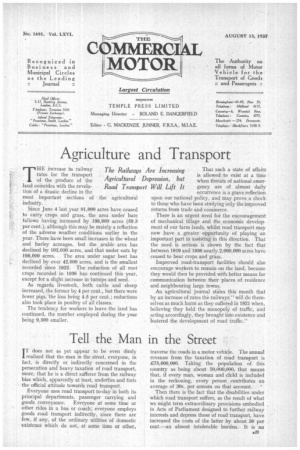Agriculture and Transport
Page 29

If you've noticed an error in this article please click here to report it so we can fix it.
The Railways Are Increasing Agricultural Depression, but Road Transport Will Lift It
THE increase in railway rates for the transport of the produce of the land coincides with the revelation of a drastic decline in the most important sections of industry. the agricultural Since June 4 last year 91,000 acres have ceased to carry crops and grass, the area under bare tallows having increased by 198,600 acres (59.3 per cent.), although this may be mainly a reflection of the adverse weather conditions earlier in the year. There have been small increases in the wheat and barley acreages, but the arable area has declined by 102,000 acres, and that under oats by 198,000 acres. The area under sugar beet has declined by over 42,000 acres, and is the smallest recorded since 1932. The reduction of all root crops recorded in 1936 has continued this year, except for a slight increase in turnips and seed.
As regards livestock, both cattle and sheep increased, the former by 4 per cent., but there were fewer pigs, 'the lass being 4.5 per cent.; reductions also took place in poultry of all classes.
The tendency for workers to leave the land has continued, the number employed during the year being 9,500 smaller. That such a state of affairs is allowed to exist at a time when threats of national emergency are of almost daily occurrence is a grave reflection upon our national policy, and may prove_a shock to those who have been studying only the improved returns from trade and commerce.
There is an urgent need for the encouragement of mechanical tillage arid the, economic development of our farm lands, whilst road transport may now .have a greater opportunity of playing an important part in assisting in this direction. That the need is serious is shown by the fact that .between 1919 and 1936 nearly 2,000,000 acres have ceased to bear crops and grass.
Improved road-transport facilities should also encourage workers to remain on the land, because they would then be provided with better means for communication between their places of residence and neighbouring large towns.
An. agricultural journal states this month that by an increase of rates the railways "will -do themselves as much harm as they suffered in 1921 when, believing they held the monopoly of traffic, and acting accordingly, they brought into existence and fostered the development of road traffic."




















































































